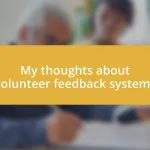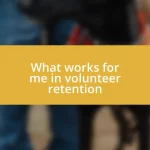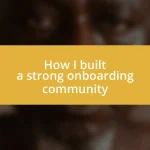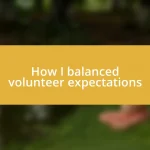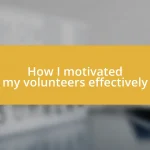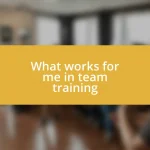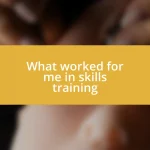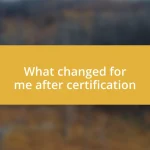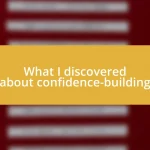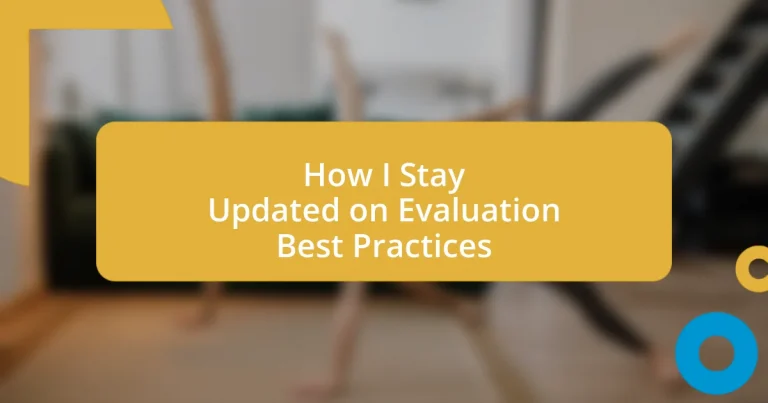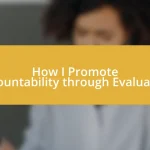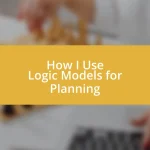Key takeaways:
- Evaluation best practices are essential for reliable data collection and informed decision-making, helping build trust with teams and stakeholders.
- Continuous learning through networking, online courses, and industry publications enhances one’s evaluation skills and opens avenues for innovative approaches.
- Participating in conferences and workshops promotes practical application of knowledge and fosters connections among professionals, enriching collaborative learning experiences.
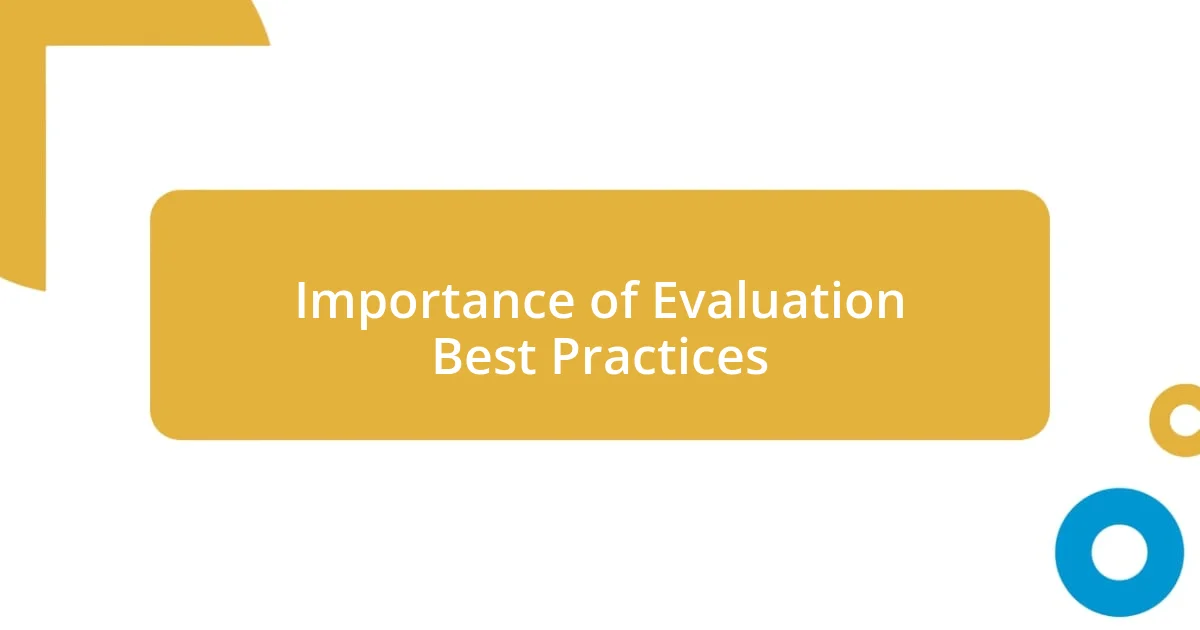
Importance of Evaluation Best Practices
I can’t stress enough how crucial evaluation best practices are in my field. They not only ensure that the data I collect is reliable but also help in making informed decisions that directly impact the projects I work on. When I think about past projects, I remember the overwhelming sense of uncertainty that comes from poorly designed evaluations. It’s a feeling I never want to experience again.
Imagine walking into a meeting with stakeholders, armed with solid, evidence-based insights. That confidence comes from knowing that I’ve adhered to best practices in evaluation. I recall a specific instance where implementing a structured evaluation process saved us from a potentially costly mistake. It made me realize how powerful these practices are in guiding decisions and enhancing the credibility of our findings.
In my experience, staying updated on these best practices impacts not just the results of an evaluation but also builds trust with my team and clients. When they see that I prioritize standards, they feel reassured that every aspect of our work has been carefully considered. Isn’t it fulfilling to know that following these practices can lead to genuine, positive change in the areas we care about most?
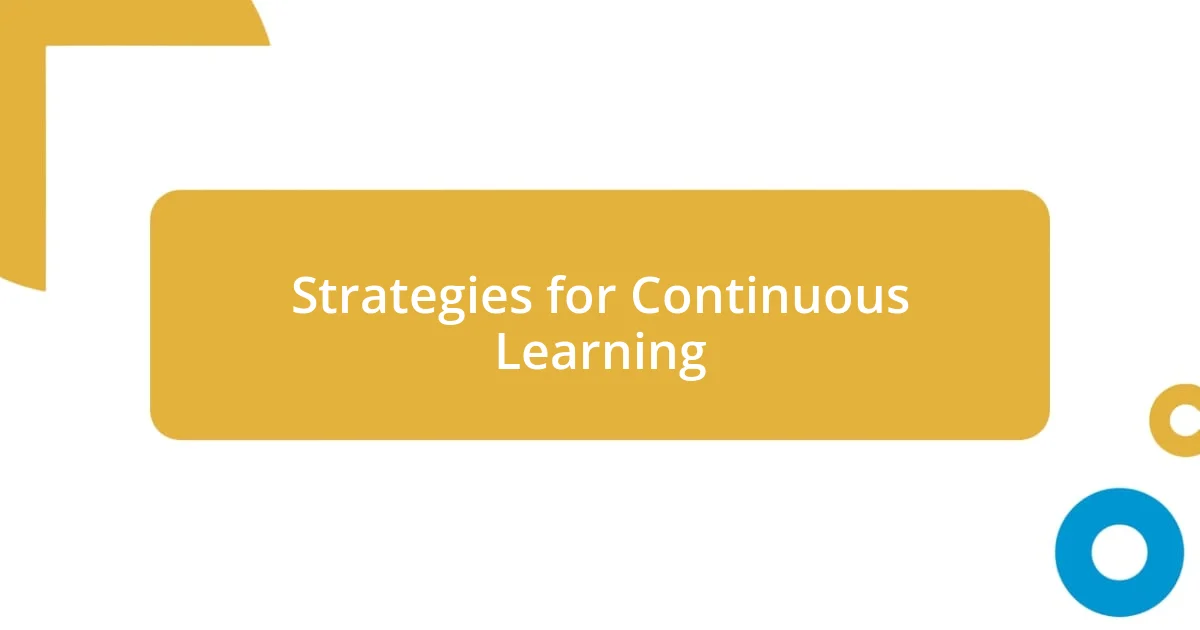
Strategies for Continuous Learning
Continuous learning is essential for staying ahead in evaluation best practices. I regularly seek out fresh information through various channels, which keeps my approach dynamic and effective. One of the most rewarding strategies I’ve adopted is connecting with a diverse network of evaluation professionals. Engaging in conversations and sharing experiences not only broadens my perspective but also inspires new ideas that I can apply in my work.
Here are some strategies I find particularly helpful for continuous learning:
- Join professional organizations: Being part of groups like the American Evaluation Association gives access to resources and networking opportunities.
- Attend workshops and webinars: These events provide practical insights and hands-on experience.
- Follow thought leaders: I make it a point to read blogs and articles by experts in the field to stay informed about the latest trends.
- Participate in peer review: Reviewing others’ work helps me see different approaches and reflects on my evaluation methodology.
- Use online courses: Platforms like Coursera and edX offer courses specifically tailored to evaluation best practices that can enhance my skills.
By immersing myself in these activities, I feel a genuine excitement for learning and growth, and it translates into the quality of my work.
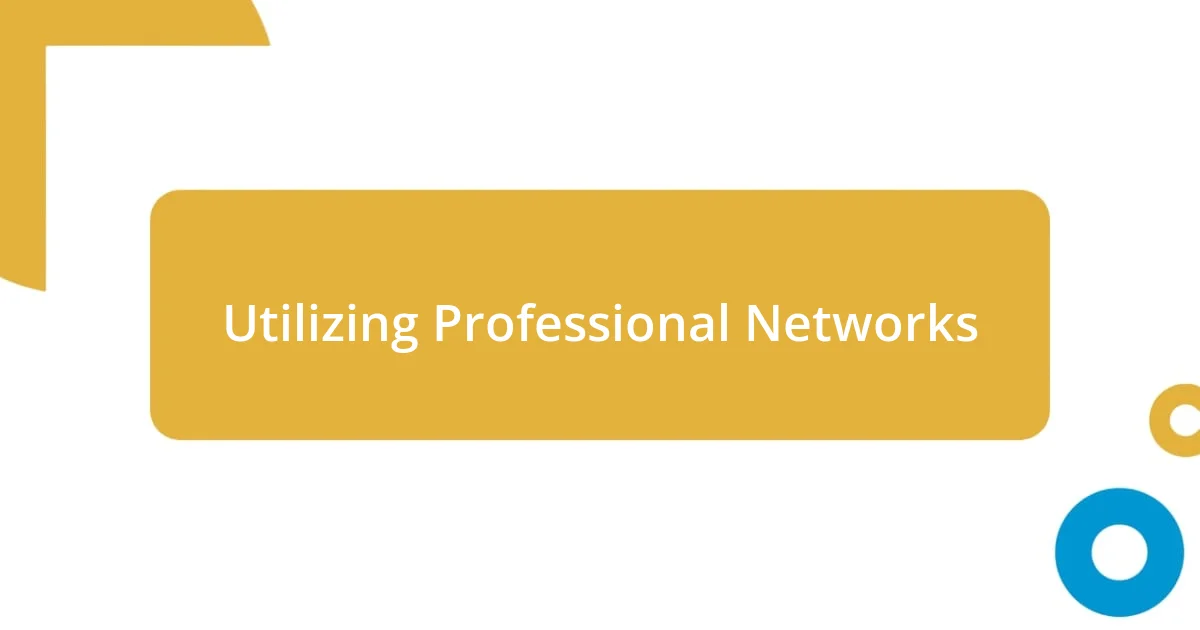
Utilizing Professional Networks
Connecting with my professional network has been a game-changer in how I stay informed about evaluation best practices. Just last month, I reached out to a former colleague who now works for a leading evaluation consultancy. We caught up over coffee, and the insights I gained from that conversation were invaluable. It reminded me how powerful relationships can be in this field. When we share challenges and successes, I often walk away with fresh perspectives or practical tools that I wouldn’t have discovered on my own.
Additionally, participating in online discussion forums has opened a world of collaborative learning. I recall a late-night chat on a professional platform where someone posed a question about ethics in evaluation. The diverse responses were enlightening, featuring a variety of cultural contexts and methodologies. It’s moments like these that make me realize the importance of leveraging my network. Each interaction enriches my understanding and better equips me to handle the complexities of my projects.
I also find that attending local meet-ups hosted by professional organizations provides a fantastic opportunity for face-to-face engagement. The last meeting I attended featured a guest speaker who shared their innovative approach to community-based evaluations. It sparked a personal connection for me, as I am deeply passionate about participatory practices. I walked away motivated and eager to incorporate those ideas into my work. The insights I gain through these network interactions often feel like little treasures that enhance my evaluation toolkit.
| Networking Strategies | Benefits |
|---|---|
| Connecting with peers | Gains diverse insights and practical tools |
| Online forums | Fosters collaborative learning and varied perspectives |
| Local meet-ups | Encourages face-to-face engagement and inspiration |
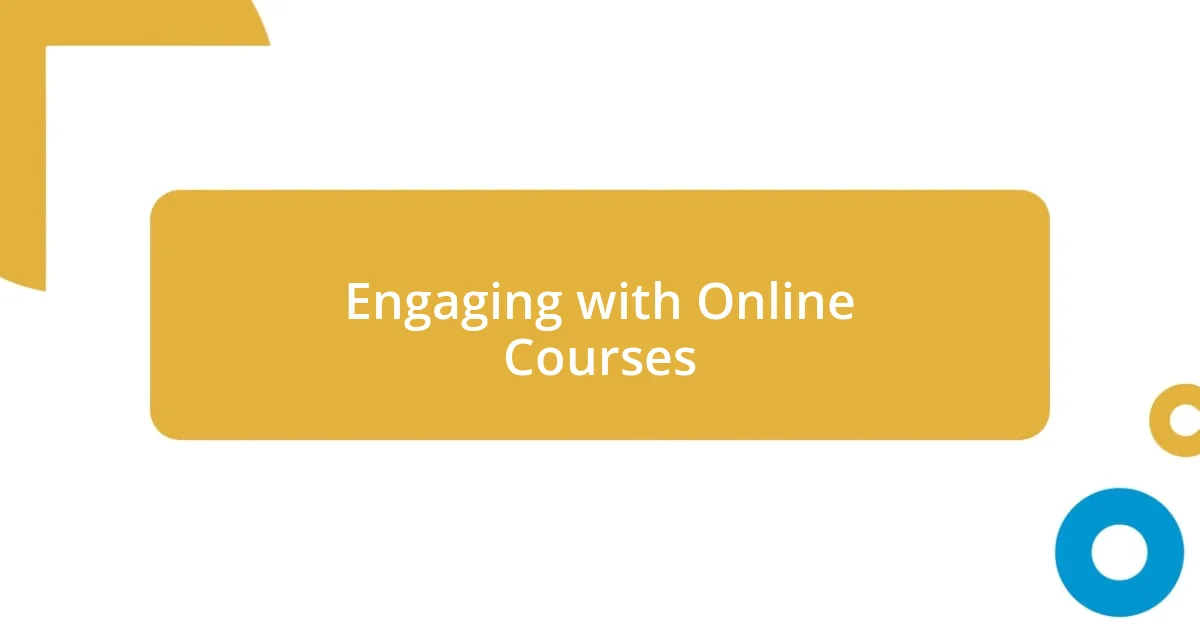
Engaging with Online Courses
Engaging with online courses has transformed my approach to evaluation best practices. I remember the first time I enrolled in a specialized course on impact evaluation. The thrill of learning fresh methodologies in real-time was exhilarating. It not only enhanced my technical skills but also opened my eyes to diverse perspectives from peers around the globe. Have you ever felt that rush of discovery? I cherish that feeling and seek it out regularly.
Platforms like Coursera and edX have been invaluable resources for me. I often dive into courses that align with my current projects or areas where I feel I need to grow. For instance, completing a course on data visualization ignited my creativity, leading to a complete overhaul of my presentation style for evaluation reports. The change not only impressed my colleagues but also made my findings more accessible to stakeholders. I’ve realized that sometimes, it’s the practical applications we take away from these courses that make all the difference.
What I love most is the interactive nature of online learning. Participating in discussion boards allows me to connect with instructors and fellow learners, sharing insights and experiences that deepen my understanding. One memorable discussion revolved around the ethical implications of evaluation—hearing different viewpoints made me reflect on my own practices. These moments of connection remind me that learning doesn’t just happen in isolation; it flourishes in a community. So, how can you incorporate online courses into your learning strategy? It’s an exciting avenue worth exploring!
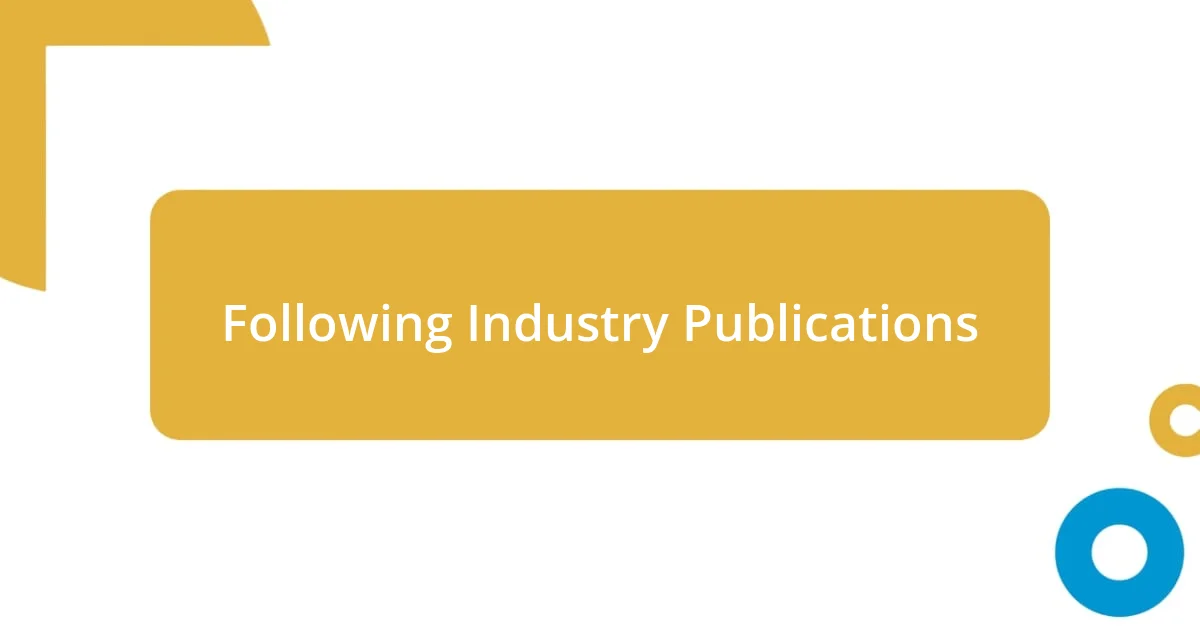
Following Industry Publications
Staying updated through industry publications has become an integral part of my professional routine. Every month, I make it a point to read journals dedicated to evaluation methodologies. I remember when I stumbled upon an article that challenged the conventional approaches I had been using. It not only reshaped my thinking but also pushed me to experiment with new techniques that I would have otherwise overlooked.
Each time I discover a study that aligns with my work, I feel a spark of excitement. Just recently, I came across a report detailing innovative evaluation strategies used in non-profit organizations. The insights I gathered were so relevant that I immediately shared them with my team during our weekly meeting. Engaging with these publications fosters a sense of community, as I often find myself discussing them with colleagues who share similar interests. Have you ever had a publication change the way you approach a project?
Moreover, I appreciate the diversity of perspectives that industry publications offer. They allow me to learn from evaluations conducted in different sectors or cultural contexts. This was evident when I read about a cross-national evaluation where local participation was pivotal. The study’s findings inspired me to rethink how I approach stakeholder engagement in my projects. I realized that effective evaluation is often about adapting successful strategies from others while tailoring them to fit my unique context.
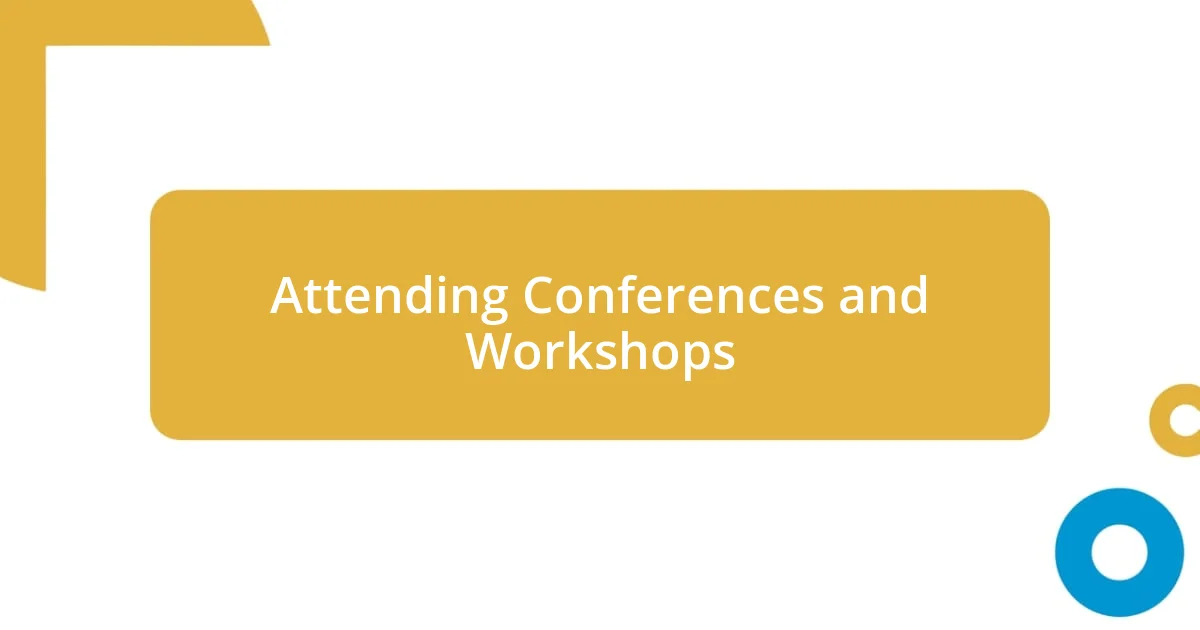
Attending Conferences and Workshops
Attending conferences and workshops has been a game changer in my professional life. A few years back, I attended a national evaluation conference that opened my eyes to emerging trends I hadn’t encountered before. The conversations I had during networking sessions filled me with inspiration and provided fresh insights that I immediately began incorporating into my work. Isn’t it amazing how a single event can ignite such a spark of creativity?
What truly stands out for me are the hands-on workshops where I can dive into practical applications of evaluation methods. I recall a workshop focused on participatory evaluation techniques; I left with tools that I started using in my fieldwork the very next week. The interactive nature of these sessions allows me to not just learn but practice and refine new skills. It’s this blend of theory and practice that enhances my confidence when implementing new strategies.
Each conference I attend is an opportunity to reconnect with fellow evaluators, contributing to a shared pool of knowledge. Recently, I bumped into an old colleague at a workshop who shared her struggles with data interpretation. It resonated deeply with me because I’ve faced similar challenges. Sharing these experiences fosters a sense of camaraderie and reminds me that we’re all on this learning journey together. Have you ever experienced that sense of connection in a professional setting? It’s those moments that truly enrich our growth and understanding.
